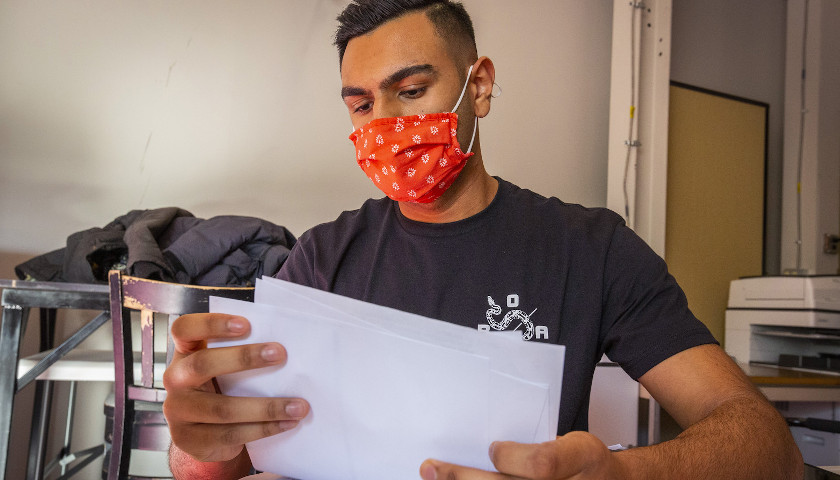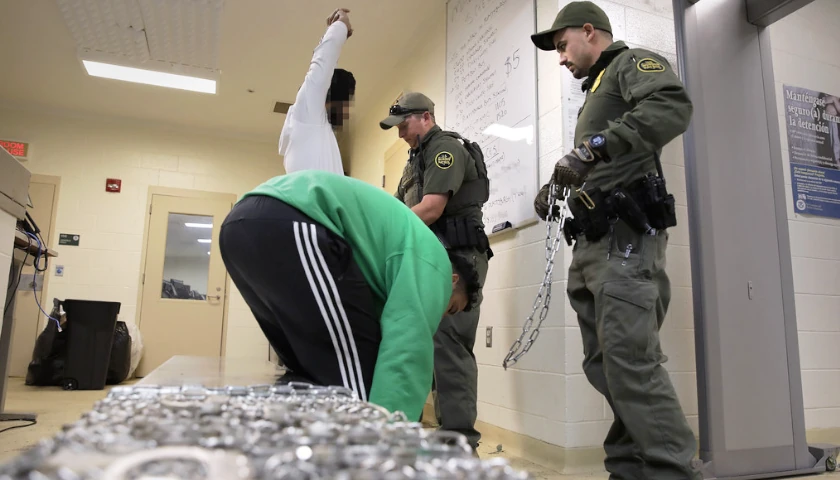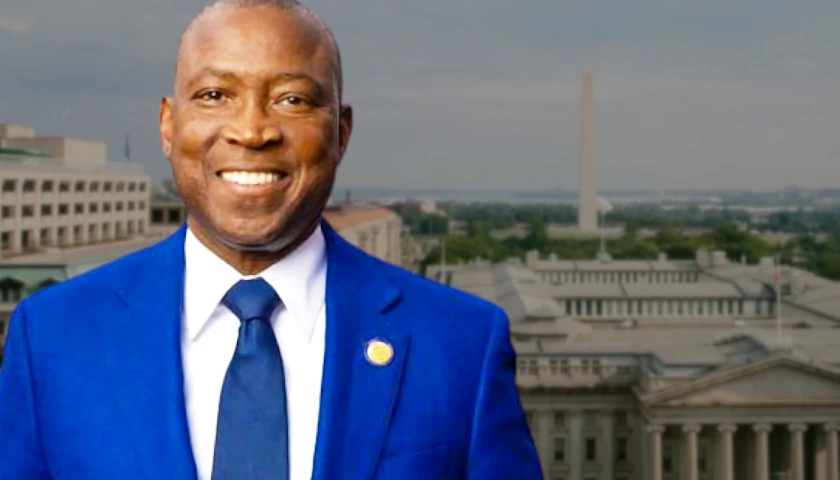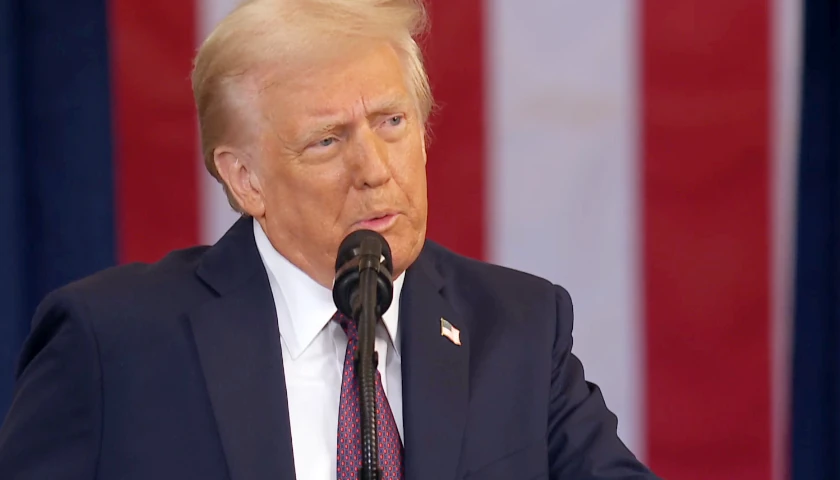by Natalia Mittelstadt
Democrats insist Republicans’ claims about non-citizen voting in U.S. elections is election denialism, despite states reporting hundreds of non-citizens were found and removed from their voter rolls.
As House Republicans passed bills ensuring that only U.S. citizens vote in federal elections, Democrats claimed that concerns over non-citizens voting is merely a GOP effort to undermine faith in elections ahead of the November presidential election.
On Thursday, the House of Representatives passed a bill repealing a 2022 Washington D.C. law that allows non-citizens to vote in local elections. The final vote was 262-143. There were 52 out of 213 Democrats who joined Republicans in supporting the bill for passage. There were 143 Democrats who voted “no” and 18 who did not vote.
The Committee on House Administration on Thursday also passed a bill that requires proof of U.S. citizenship to register to vote in federal elections.
During the committee’s hearing on Thursday ahead of the votes on the bills, Rep. Joe Morelle, D-N.Y., referenced a hearing the committee held the previous week on the bills against non-citizen voting, saying it was “wasting this committee’s time” and “a waste of the taxpayer resources” in order “to disseminate the disproven lies to actively undermine American faith in our democracy.”
At last week’s hearing, Morelle said that Republicans are using the “non-issue” to explain why former President Donald Trump will lose the 2024 presidential election.
“This hearing is about preemptively covering Donald Trump’s lies,” Morelle said. “The hearing isn’t about law and order. It’s about laying the foundation for the next big lie. It’s about saying that illegal voting is the cause of an election defeat.”
Also during that hearing, Rep. Terri Sewell, D-Ala., flatly claimed that non-citizens are not voting in U.S. elections. Sewell introduced into evidence an opinion article by Morelle published last Thursday, in which he wrote, “independent sources have repeatedly debunked this myth, verifying that non-citizens voting in federal elections is extraordinarily rare and has never been shown to impact the outcome of any election.”
However, J. Christian Adams, president of the Public Interest Legal Foundation (PILF), testified at the hearing last week, saying, “Non-citizens are, in fact, getting onto American voter rolls, and some of them are voting. The data show that most often non-citizens are getting on the rolls through the motor voter registration process or third-party registration drives.”
In an interview to be aired Friday, Texas Attorney General Ken Paxton (R) expressed his concerns of non-citizens voting in elections.
Paxton told the “Just the News, No Noise” TV show, “If the Biden administration gives illegals a Social Security Number, and they can use that to get a driver’s license, and typically you can vote. And if you don’t have proof of citizenship, then you have potentially millions of people in the right places, that the Biden administration has moved to the right places where they want them, getting them registered to vote. And that’s, I believe, the strategy that the Biden administration is relying on — this strategy more like they did mail-in ballots last time.”
During the House Administration Committee hearing last week, committee chairman Bryan Steil, R-Wis., said that 500 non-citizens are registered to vote in Washington, D.C.
According to a PILF report from last May, Chicago records show that 394 foreign nationals were removed from the city’s voter rolls since 2007, with 20 of them recorded as casting 85 ballots.
Also during that month, Virginia removed 1,481 voter registrations for lack of U.S. citizenship.
In April 2023, PILF reported that Maricopa County, Ariz., records showed that since 2015, 222 foreign nationals were removed from the county’s voter rolls, with nine of them recorded as casting 12 ballots across four federal elections.
According to a February PILF report, since 2021, 186 registrants were removed from voter rolls Pima County, Ariz., for lack of U.S. citizenship. Of those, seven had cast ballots in two federal and local elections.
In 2017, Schmidt, a Republican who was a Philadelphia city commissioner at the time, told a Pennsylvania Senate committee that there were over 100,000 matches of voter registration records to state driver’s license numbers with Immigration and Naturalization Service indicators.
The matches don’t mean that all of those people were registered to vote, but Schmidt argued: “We’re not talking about an insignificant number here. We’re talking about a potentially very significant number of thousands and tens of thousands.”
The Pennsylvania Department of State announced in September 2017 that records indicated 1,160 non-citizens had since 1972 requested their voter registrations be canceled.
In Georgia, an audit by Secretary of State Brad Raffensperger (R) found in 2022 that over 1,600 non-citizens tried to register to vote.
“[W]hat I found is we had 1,634 that were never put on the voter rolls, they were in the pending status, because they couldn’t prove their citizenship,” Raffensperger told the “John Solomon Reports” podcast at the time. “That’s a felony in Georgia to even attempt to register if you’re a noncitizen. And that’s a one to 10-year prison term, and up to a $100,000 fine.”
Prior to Georgia’s audit, at the end of 2021, then-Texas Secretary of State John Scott (R) released the results of the first phase of his audit of the states’s voter rolls, which found that 11,737 potential non-U.S. citizens were identified as being registered to cast ballots, with many located in the counties around Texas’ two largest cities of Houston and Dallas.
Last week, Ohio Secretary of State Frank LaRose (R) directed all 88 counties to begin a removal process for non-citizens on Ohio’s voter rolls following a review by his office’s Public Integrity Division and Office of Data Analytics and Archives. The review analyzed data from the Ohio Bureau of Motor Vehicles (BMV) and found 137 voter registrations of non-citizens who had twice confirmed their lack of U.S. citizenship.
According to a 2018 PILF report, there were 3,120 non-citizen removals from various city and county voter rolls across the country in the prior decade.
Another PILF report noted that ahead of the 2014 midterm elections, North Carolina found that 1,454 individuals on state voter rolls were not naturalized U.S. citizens. Of those, 89 registrants appeared at polling places, 24 of which were challenged, with 11 of the challenges sustained.
While non-citizens are prohibited from voting in federal, state, and most local elections, California, Maryland, Vermont, and Washington, D.C., allow non-citizens to vote in local elections.
New York City approved a law in 2021 that would permit non-citizens to vote in local elections, but it has twice been struck down in court. In March, the New York City Council filed a notice of appeal to the New York Court of Appeals, the state’s highest court, seeking to have the decisions of two lower courts overturned.
Alabama, Arizona, Colorado, Florida, Louisiana, North Dakota, and Ohio have all included language in their state constitutions that prohibits non-citizen voting. Meanwhile, Iowa, Kentucky, Missouri, South Carolina, and Wisconsin all have ballot measures for voters to decide this year whether non-citizens should be prohibited from voting in state elections.
Arizona has bifurcated elections, in which residents who provide proof of U.S. citizenship can vote in all elections while the rest may vote only in federal elections, resulting in ballots cast by voters who haven’t proven their U.S. citizenship.
At least around 5,800 federal-only ballots were cast in the November 2020 presidential election in Arizona.
The Supreme Court ruled in 2013 that Arizona must accept U.S. voter registration forms because of federal requirements under the 1993 National Voter Registration Act (NVRA). Federal voter registration forms require those filling them out only to sign a sworn declaration that they are U.S. citizens.
– – –
Natalia Mittelstadt graduated from Regent University with Bachelor of Arts degrees in Communication Studies and Government.




